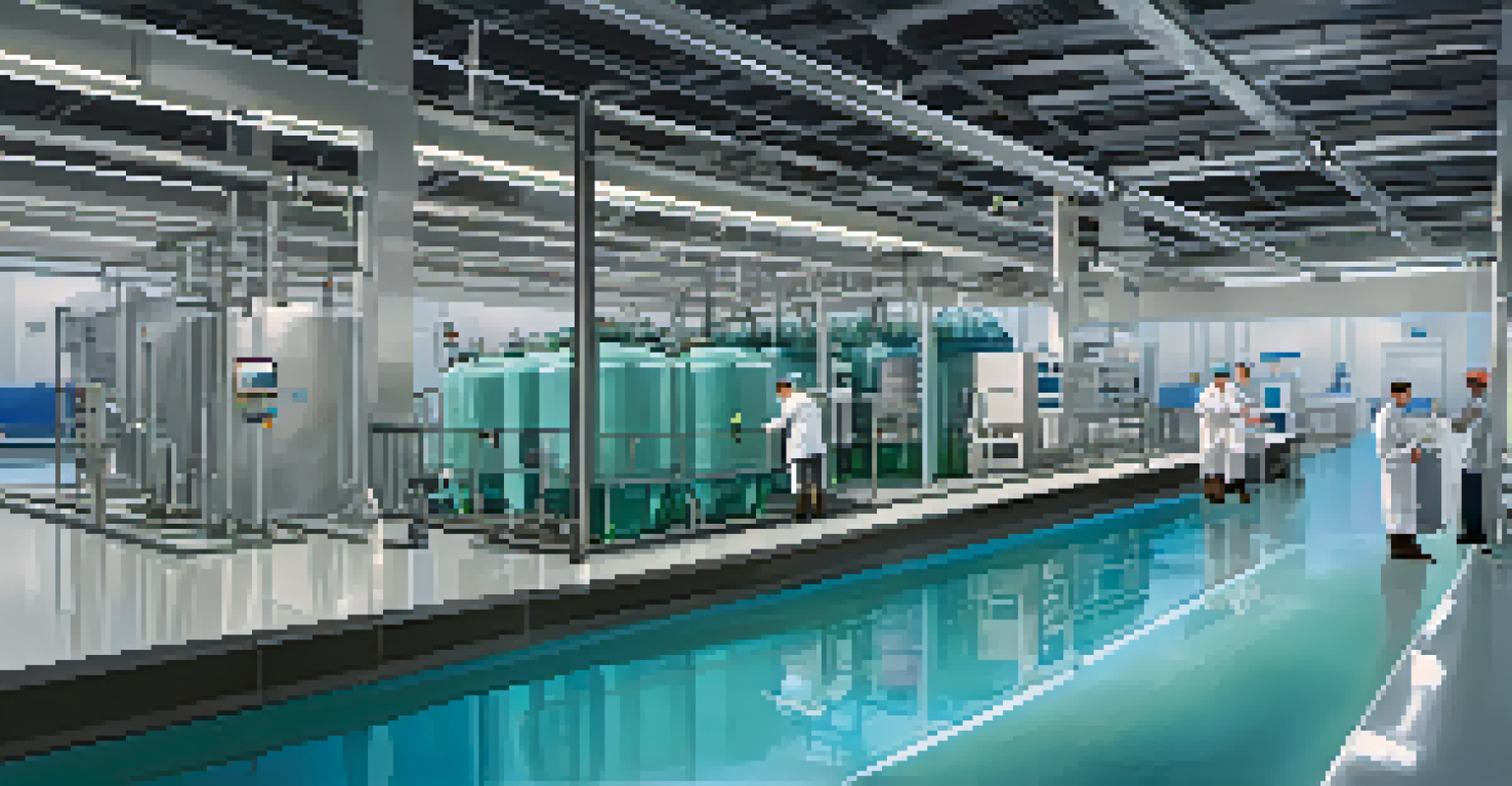The Importance of Water Supply Management in NYC Urban Life

Understanding NYC's Unique Water Supply System
New York City's water supply system is a marvel of engineering, providing over a billion gallons of fresh water daily to its residents. The system draws primarily from a network of reservoirs located in nearby upstate regions, spanning over 125 miles. This unique setup ensures that the city's diverse neighborhoods have consistent access to clean drinking water, a crucial element for urban life.
Water is the driving force of all nature.
The journey of water from reservoirs to taps involves a complex series of pipes, treatment facilities, and pumping stations. This infrastructure not only ensures quality and safety but also allows for efficient distribution across a sprawling metropolis. Given the city's size and density, managing this intricate network is no small feat and requires meticulous planning and maintenance.
Furthermore, the reliance on upstate water sources emphasizes the importance of inter-regional cooperation. Protecting these water sources from pollution and overuse is vital, as they directly influence the health and well-being of millions of New Yorkers.
The Impact of Water Quality on Public Health
Water quality significantly affects public health, making effective management essential. Contaminated water can lead to serious health issues, including gastrointestinal infections and long-term diseases. In NYC, stringent regulations and ongoing monitoring ensure that drinking water meets high safety standards, protecting residents from potential hazards.

The city employs advanced filtration and disinfection techniques to treat water before it reaches consumers. Regular testing and public reporting help maintain transparency and trust in the water supply. When residents know their water is safe, they are more likely to use it freely in their daily lives, from cooking to personal hygiene.
NYC's Water Supply: An Engineering Marvel
New York City's intricate water supply system delivers over a billion gallons of fresh water daily, relying on reservoirs and a vast network of infrastructure.
Moreover, public awareness campaigns often highlight the importance of conserving water and understanding its sources. This education fosters a community that values and actively participates in protecting water quality, further enhancing the overall health of the urban population.
Water Supply Management and Climate Resilience
As climate change poses new challenges, New York City must adapt its water supply management strategies. Extreme weather events, including heavy rainfall and prolonged droughts, can disrupt the delicate balance of water availability. By investing in infrastructure improvements and innovative technologies, the city is increasingly focused on building resilience against these climate impacts.
The health of our waters is the principle measure of how we live on the land.
One approach has been the development of green infrastructure, such as rain gardens and permeable pavement, which help absorb rainwater and reduce runoff. This not only aids in flood prevention but also enhances the natural water cycle, contributing to a more sustainable urban environment. Effective water management now includes strategies that account for the unpredictable nature of climate.
Additionally, community engagement in these initiatives fosters a sense of shared responsibility. When residents understand their role in water conservation and management, they become advocates for sustainable practices, helping to ensure that the city's water supply remains reliable in the face of future challenges.
The Economic Value of Efficient Water Management
Efficient water supply management has significant economic implications for New York City. A reliable water system supports various industries, from hospitality to healthcare, contributing to the city's overall economic stability. Businesses thrive in environments where they can count on essential services, including a steady water supply.
Moreover, the cost of water treatment and distribution is closely tied to public investments in infrastructure. When the city prioritizes efficient management, it can minimize costs associated with water loss and treatment failures. This, in turn, leads to lower water bills for residents and businesses alike, promoting economic growth.
Public Health Depends on Water Quality
Stringent regulations and advanced treatment methods ensure that NYC's drinking water meets high safety standards, directly impacting public health.
Investing in water infrastructure also creates jobs, both in construction and ongoing maintenance. A robust water supply system not only sustains current economic activities but also attracts new businesses looking for reliable services in a vibrant urban setting.
Community Engagement in Water Conservation Efforts
Community involvement is a key element in effective water supply management. Programs that educate residents about water conservation and pollution prevention empower them to take action. From simple measures like fixing leaks to participating in local clean-up events, individuals can make a difference in maintaining the health of the water supply.
The city offers various resources and initiatives to engage the public, such as workshops and online tools that track water usage. By fostering a sense of ownership over local water resources, New Yorkers are more likely to embrace sustainable practices that benefit the entire community. This collective effort can lead to significant reductions in water waste.
Additionally, community feedback plays a crucial role in shaping water management policies. When residents voice their concerns and suggestions, it helps city officials create more effective strategies that align with the needs and values of the population.
Challenges Facing NYC's Water Supply Management
Despite its strengths, NYC's water supply management faces several challenges. Aging infrastructure, for instance, can lead to leaks and inefficiencies that waste valuable resources. Addressing these issues requires significant investment and strategic planning to upgrade or replace outdated systems.
Moreover, the increasing population density in urban areas places additional strain on existing water resources. As more people move to the city, the demand for water rises, leading to potential shortages or the need for expanded infrastructure. Balancing these demands while maintaining high water quality standards is an ongoing challenge.
NYC's Water Supply System Explained
New York City's intricate water supply system delivers over a billion gallons of fresh water daily, relying on upstate reservoirs and a complex network of infrastructure.
Finally, climate change presents a looming threat that complicates water supply management. The city must continuously adapt its strategies to mitigate risks associated with extreme weather and changing precipitation patterns, ensuring that the water supply remains sustainable for future generations.
The Future of Water Supply Management in NYC
Looking ahead, the future of water supply management in NYC appears promising, driven by innovation and sustainability. The city is exploring cutting-edge technologies, such as smart water meters and advanced analytics, to enhance efficiency and monitoring. These tools allow for real-time data collection, enabling quicker responses to leaks and system failures.
Moreover, increased collaboration between government agencies, environmental organizations, and the community is crucial for developing effective strategies. By combining resources and expertise, stakeholders can tackle complex issues more effectively and ensure that water management practices are equitable and sustainable.

As New York City embraces these advancements, it sets a standard for urban water supply management worldwide. By prioritizing sustainability and innovation, the city not only secures its water future but also inspires other metropolitan areas to follow suit.